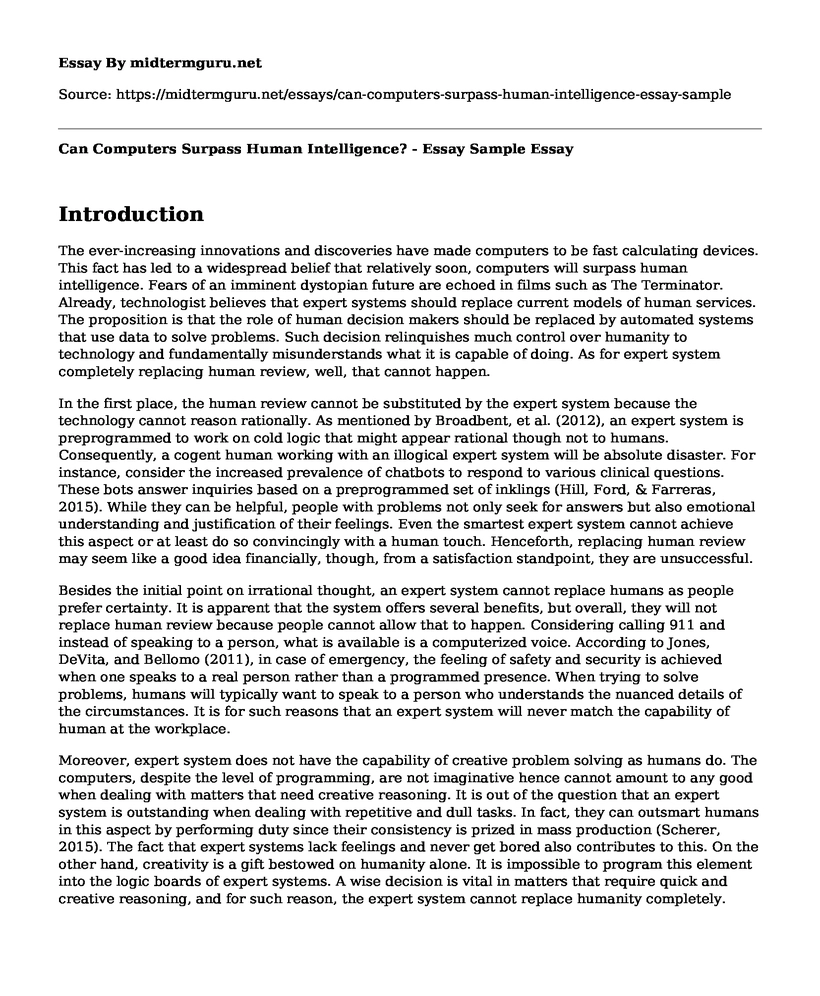Introduction
The ever-increasing innovations and discoveries have made computers to be fast calculating devices. This fact has led to a widespread belief that relatively soon, computers will surpass human intelligence. Fears of an imminent dystopian future are echoed in films such as The Terminator. Already, technologist believes that expert systems should replace current models of human services. The proposition is that the role of human decision makers should be replaced by automated systems that use data to solve problems. Such decision relinquishes much control over humanity to technology and fundamentally misunderstands what it is capable of doing. As for expert system completely replacing human review, well, that cannot happen.
In the first place, the human review cannot be substituted by the expert system because the technology cannot reason rationally. As mentioned by Broadbent, et al. (2012), an expert system is preprogrammed to work on cold logic that might appear rational though not to humans. Consequently, a cogent human working with an illogical expert system will be absolute disaster. For instance, consider the increased prevalence of chatbots to respond to various clinical questions. These bots answer inquiries based on a preprogrammed set of inklings (Hill, Ford, & Farreras, 2015). While they can be helpful, people with problems not only seek for answers but also emotional understanding and justification of their feelings. Even the smartest expert system cannot achieve this aspect or at least do so convincingly with a human touch. Henceforth, replacing human review may seem like a good idea financially, though, from a satisfaction standpoint, they are unsuccessful.
Besides the initial point on irrational thought, an expert system cannot replace humans as people prefer certainty. It is apparent that the system offers several benefits, but overall, they will not replace human review because people cannot allow that to happen. Considering calling 911 and instead of speaking to a person, what is available is a computerized voice. According to Jones, DeVita, and Bellomo (2011), in case of emergency, the feeling of safety and security is achieved when one speaks to a real person rather than a programmed presence. When trying to solve problems, humans will typically want to speak to a person who understands the nuanced details of the circumstances. It is for such reasons that an expert system will never match the capability of human at the workplace.
Moreover, expert system does not have the capability of creative problem solving as humans do. The computers, despite the level of programming, are not imaginative hence cannot amount to any good when dealing with matters that need creative reasoning. It is out of the question that an expert system is outstanding when dealing with repetitive and dull tasks. In fact, they can outsmart humans in this aspect by performing duty since their consistency is prized in mass production (Scherer, 2015). The fact that expert systems lack feelings and never get bored also contributes to this. On the other hand, creativity is a gift bestowed on humanity alone. It is impossible to program this element into the logic boards of expert systems. A wise decision is vital in matters that require quick and creative reasoning, and for such reason, the expert system cannot replace humanity completely.
Conclusion
In conclusion, while warnings of the impending dystopian future are apparent, there is no need to fret since computers and the concept of the expert system cannot replace human review. It is impossible to program some crucial aspects into the databases meaning that despite widespread technology use, human knowledge will still be essential in problem-solving. Humanity beats computer system because of rationality, preferability, and creativity that the expert system lacks. Since the expert system cannot achieve the above traits, it will never replace human review.
References
Broadbent, E., Tamagawa, R., Patience, A., Knock, B., Kerse, N., Day, K., & MacDonald, B. A. (2012). Attitudes towards healthcare robots in a retirement village. Australasian journal on ageing, 31(2), 115-120.
Hill, J., Ford, W. R., & Farreras, I. G. (2015). Real conversations with artificial intelligence: A comparison between human-human online conversations and human-chatbot conversations. Computers in Human Behavior, 49, 245-250.
Jones, D. A., DeVita, M. A., & Bellomo, R. (2011). Rapid-response teams. New England Journal of Medicine, 365(2), 139-146.
Scherer, M. U. (2015). Regulating artificial intelligence systems: Risks, challenges, competencies, and strategies. Harv. JL & Tech., 29, 353.
Cite this page
Can Computers Surpass Human Intelligence? - Essay Sample. (2023, Jan 20). Retrieved from https://midtermguru.com/essays/can-computers-surpass-human-intelligence-essay-sample
If you are the original author of this essay and no longer wish to have it published on the midtermguru.com website, please click below to request its removal:
- Essay Sample: Database Methods for Database Management IP
- Significance of Drones in Disaster Management and Commerce
- Essay on Informational Approach in Measuring Organizational Effectiveness
- Essay Example on UK Energy Industry
- Research Paper on Key Issues in Cyber Policy
- Quantitative Research Approach for Data Collection on Chosen Topic - Essay Sample
- Healthcare Systems: Complexity, Resources & Patient Care - Essay Sample







